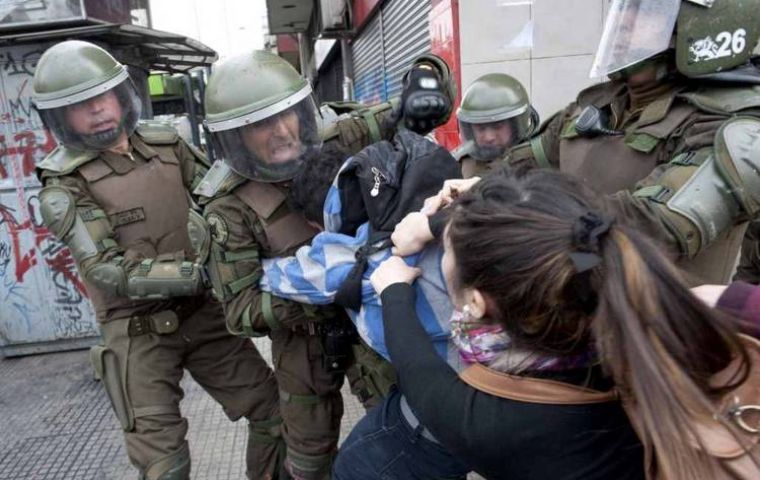MercoPress. South Atlantic News Agency
Chilean students warn presidential candidates education reform is pending
 A students’ peaceful march ended in rioting, a month ahead of national elections (Pic AP)
A students’ peaceful march ended in rioting, a month ahead of national elections (Pic AP) In an anticipation of what is waiting for whoever wins next month’s presidential election in Chile, thousands of students again took to the streets to demand education reform as they have been doing for several years now.
Even when the peaceful march turned violent as towards the end it was disrupted by groups of violent hooded protestors that attacked the police with rocks, sticks and other objects and set barricades on fire, the core message from the 20.000 demonstrators (50.000 according to organizers) was clear.
The student march was organised before Chile’s 17 November presidential ballot and education reform remains a key issue. After several years of student marches that often paralysed Chile's major cities and stoked expectations of change, students say they have seen few real benefits.
President Sebastian Piñera's government focused part of it in the 2013 budget on financing school loans at lower rates. But with poor public schools, expensive private universities, unprepared teachers and unaffordable loans, students said the system still fails them.
Students and teachers organizations want to change the tax system so the rich pay more. They also want the state back in control of the mostly privatised public universities to ensure quality and the insist change will come when the private sector is regulated and education is no longer a for-profit undertaking.
“There is no way this social outcry will stop next year,” Moisés Paredes, spokesman for the high-school student association Cones, said.
The movement’s demands for a new education system can be summarized in five basic points: free, public, autonomous and democratic education, guaranteed as a right by the state and not operated for-profit.
While the students’ calls for free education and an end to profit-making have been ignored by the governing conservative Alianza coalition, the majority of the nine presidential candidates are in favor of overhauling the current education system to varying degrees.
Current presidential front-runner and former President Michelle Bachelet of the left-leaning Nueva Mayoria pact, says she will make university education free within six years — backpedaling on comments made in April qualifying the abolition of fees as for all ‘unjust’ — but still suffers from accusations she failed to address the problem in her first presidency.
Although the movement rejects the education policies of both the Alianza and those of the Nueva Mayoria, it remains unclear whether this repudiation of the two dominant political factions will translate into votes for any of the independent candidates claiming to represent them.
Marco Enriquez-Ominami of the left-wing Progressive Party (PRO), Humanist Party (PH) candidate Marcel Claude and right-leaning independent Franco Parisi have all included free education in their presidential platform and are polling 7%, 3.8% and 10.6% respectively according to the latest opinion polls.
In comparison Bachelet is polling at 37.7%, while Alianza candidate Evelyn Matthei is at 12.3%. If no candidate wins more than half of all votes, a second round is held between the top two candidates.
The Chilean education system is a legacy from Dictator Pinochet times who believed government schools were the source of social activism and Marxist penetration, and thus de-funded the public sector and encouraged private education particularly universities, making the system highly discriminative: good education but expensive for the rich and poor free education for the poor. (MP/Santiago Times).-




Top Comments
Disclaimer & comment rulesCommenting for this story is now closed.
If you have a Facebook account, become a fan and comment on our Facebook Page!